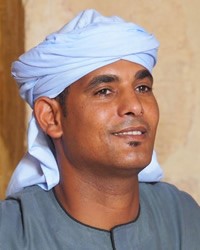Arab, Arabic Gulf Spoken in Iraq

Photo Source:
Hella Nijssen - Pixabay
|
Send Joshua Project a map of this people group.
|
| People Name: | Arab, Arabic Gulf Spoken |
| Country: | Iraq |
| 10/40 Window: | Yes |
| Population: | 51,000 |
| World Population: | 7,562,600 |
| Primary Language: | Arabic, Gulf |
| Primary Religion: | Islam |
| Christian Adherents: | 0.90 % |
| Evangelicals: | 0.10 % |
| Scripture: | Portions |
| Ministry Resources: | Yes |
| Jesus Film: | Yes |
| Audio Recordings: | Yes |
| People Cluster: | Arab, Arabian |
| Affinity Bloc: | Arab World |
| Progress Level: |
|
Introduction / History
Within the Arabic language there are numerous dialects and groups of dialects. One major group is given the general term “Arabiya “or “Gulf Arabic” since it is spoken in Saudi Arabia and the nearby Gulf states along the edges of the Arabian Desert. This includes not only Saudi Arabia but also Yemen, the United Arab Emirates, Qatar, Kuwait and southern Iraq.
What Are Their Lives Like?
A small number of Gulf Arabs in Iraq are nomadic Bedouins. They live a harsh existence, but they know how to survive in a land of little vegetation and even less water. Others are in urban areas where they take on typical urban jobs. They often work in the petroleum industry. The lifestyles of the two groups is vastly different; they even speak different dialects of Gulf Arabic.
In the past, Gulf Arabs considered it shameful and degrading to have jobs doing manual labor. However, this has changed somewhat in recent years. Because of the need for improved health facilities, more income, and better housing, some have accepted wage-paying jobs.
In accordance with their Muslim religion, Gulf Arab marriages are typically endogamous, which means that they only marry within a small social circle. Inheritance is patrilineal (passed down from fathers to their sons). Gulf Arab clothing is designed for the harsh desert climate. It is made of lightweight, light-colored fabric and is also loose-fitting, allowing for the circulation of air.
What Are Their Beliefs?
Half of the Gulf Arab are Shafi 'ite Muslim; many are Hanbalite (Wahhabi) Muslim; and the rest are Malikite Muslim. As Muslims, they follow the teachings of the prophet Mohammed. They believe that the only way to God is through following the teachings of their holy book, the Koran. Their religion is one of works based on these five "pillars": (1) A Muslim must affirm that "there is no god but Allah, and Mohammed is his prophet." (2) Five times a day he must pray while facing Mecca. (3) He must give an obligatory percentage (very similar to tithes) on an annual basis. (4) He must fast during Ramadan, the ninth month of the Muslim year. (5) He must try to go on a pilgrimage to Mecca at least once in his lifetime.
What Are Their Needs?
A profession of faith in Jesus may cost a person his family, his honor, his job or even his life. Evangelization of this people group will be challenging due to the nature of the Gulf Arabs' lifestyle and rigid belief system. Prayer is the key to reaching them with the gospel.
Prayer Points
Pray for the Holy Spirit to penetrate the hearts of Gulf Spoken Arabs through dreams and visions of the victorious and glorious Christ.
Pray for a spiritual hunger among Gulf Arabs in Iraq that will lead them to the cross.
Pray that multiplying churches will be raised up among Gulf Arabs in Iraq.
Ask the Holy Spirit to thrust out people who are willing to share the love of Christ with Gulf Arabs in Iraq.